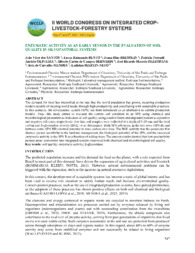Enzymatic activity as an early sensor in the evaluation of soil quality in silvopastoral systems.
Enzymatic activity as an early sensor in the evaluation of soil quality in silvopastoral systems.
Author(s): SANTOS, J. V. DOS; BENTO, L. R.; BRESOLIN, J. D.; OLIVEIRA, P. P. A.; BERNARDI, A. C. de C.; PEZZOPANE, J. R. M.; MENDES, I. de C.; MARTIN NETO, L.
Summary: The demand for food has intensified at the rate that the world population has grown, requiring production models capable of meeting world needs, through high productivity and conciliating with sustainable practices. In this scenario, the silvopastoral system (SPS) has been introduced as an alternative to current production models. Thus, this study aimed to evaluate the current soil condition in an SPS using chemical and microbiological parameters as indicators of soil quality, using a native forest and degraded pasture as a positive and negative reference, respectively. For this, soil samples were collected at a depth of 0-10 cm, and the total carbon and B-glycosidase activity (BGL) were determined. Both SPS sub-areas, in the tree rows (SPS-R) and between rows (SPS-BR) showed potential to store carbon over time. The BGL activity was the parameter that showed greater sensitivity to the land use management, the biological potential of the SPS, and the increased enzymatic activity in the SPS-R as a function of adding trees. The current results showed that low productivity pasture areas' conversion into integrated systems improved both chemical and microbiological soil quality.
Publication year: 2021
Types of publication: Paper in annals and proceedings
Keywords: B glycosidase, Enzymatic activity, ILPF, Soil quality
Observation
Some of Embrapa's publications are published as ePub files. To read them, use or download one of the following free software options to your computer or mobile device. Android: Google Play Books; IOS: iBooks; Windows and Linux: Calibre.
Access other publications
Access the Agricultural Research Database (BDPA) to consult Embrapa's full library collection and records.
Visit Embrapa Bookstore to purchase books and other publications sold by Embrapa.

